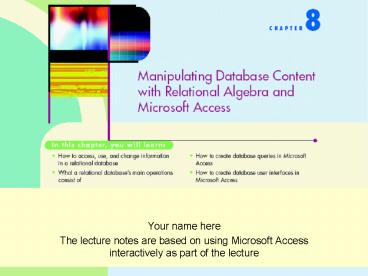Your name here - PowerPoint PPT Presentation
1 / 19
Title:
Your name here
Description:
A video rental checkout form. Manipulating Information in Relational Databases ... A Video Rental Checkout Form. See Access database for details of forms design ... – PowerPoint PPT presentation
Number of Views:21
Avg rating:3.0/5.0
Title: Your name here
1
- Your name here
- The lecture notes are based on using Microsoft
Access interactively as part of the lecture
2
Manipulating Database Content with Relational
Algebra and Microsoft Access
- How to manipulate information in relational
databases - Using relational algebra and Microsoft Access
- How to define simple one-table queries
- Projection queries
- Selection queries
- How to define queries that combine multiple
tables - Product queries
- Join queries
- Queries with multiple joins
- How to combine relational operations to create
complex queries - Defining complex queries with Microsoft Access
- How to define queries with set operators
- Union, intersection, difference
- How to create user interfaces in Access
- A video rental checkout form
3
Manipulating Information in Relational Databases
- A relational database table
- Consists of a set of rows (also called records)
- each row in a table has the same number and types
of attributes. - When you send a query to the database, it
- Finds the appropriate rows of information in the
stored tables - Performs the requested operations on the data
- Represents the results in a new temporary table
- Delivers the results table to the user
- Destroys the table when the user no longer needs
it
4
Queries and Query Languages
- Queries can be represented in many ways
- Relational algebra (explained in Chapter 8)
- Query by example diagrams (as in Microsoft
Access) - SQL, the standard query language (explained in
Chapter 9) - 4 basic types of queries
- A projection operation produces a result table
with - Only some of the columns of its input table.
- A selection operation produces a result table
with - All of the columns of the input table
- Only those rows of its input table that satisfy
some criteria. - A join or product operation produces a result
table by - Combining the columns of two input tables.
- A set operation produces a result table by
- Combining rows from one or the other of its input
tables - This chapter focuses on manipulating relational
tables with relational algebra and Microsoft
Access
5
Projection Queries
- A projection query selects some of the columns of
the input table - project Customer onto (firstName, lastName)
- Relational algebra form
- ?firstName,lastName(Customer)
- Notice that the result table has fewer rows
- Duplicate rows have been removed
6
Projection in Access
Query wizard dialog
Source table
Select button (right arrow)
Selected fields
7
Selection Queries
- A selection query selects rows that match a
selection criteria - select from Customer where lastName Doe.
- Relational algebra form
- ?lastNameDoe(Customer)
8
Selection query in Access
All fields selected
Show button unselected
Selection criteria lastName Doe
9
More complex criteria
- The selection criterion can be any expression
- select from TimeCard where ssn 376-77-0099
and date lt 01-mar-2002 - Shaded rows are result rows
- Relational algebra form
- ?ssn376-77-0099 and datelt01-mar-2002(TimeCard
)
10
Complex criteria in Access
Selection criterion datelt01-mar-2002
Field selection list
11
Product Queries
- A product query produces a result table from 2
inputs - Combines the attributes from two different tables
- Produces a new table with more attributes than
either of the original ones - is product of Employee and TimeCard
- Relational algebra form
- Employee ? TimeCard
- Combines every row of one table with every row of
other table - We really want to combine an employee and a
timecard for a single employee
Rows from first time card
Rows from second time card
12
Join queries
- A join query is a product with a restriction on
the result rows - The join condition determines which rows match
- Only matching rows are in the result table
- Typical join condition is equality of attributes
- join Employee and TimeCard where Employee.ssn
TimeCard.ssn - Relational algebra form
- Employee ?Employee.ssnTimeCard.ssn TimeCard
- Some rows of result shown in this table
13
Join query in Access
Join line
14
Queries with Multiple Joins
- This query has 2 joins
- Join Rental and Video
- Join that table with Movie
- Relational algebra form
- ? accountId, videoId, dateRented, dateDue, title,
cost ((Rental ?videoId Video) ?movieId Movie)
15
Combining Relational Operations
- Combine selection, projection, and join in one
query - project videoId, title, and dateDue from Rental
join Video on videoId join Movie on movieId where
accountId113 and - Relational algebra form
- ? videoId, title, dateDue((? accountId113(Rental)
?videoId Video) ?movieId Movie)
16
Defining Complex Queries with Microsoft Access
Four source tables and three joins
Selecting by dateRented
Projecting 4 fields
17
Applying Set Operators to Tables
- Set operations include
- Union, intersection, and difference
- Set operations can be applied to any tables with
the same shape - The same order and type of attributes
- Attribute names do not have to agree
- For example
- Rental (accountId number, videoId number,
dateRented date, dateDue date, cost currency) - PreviousRental (accountId number, videoId number,
dateRented date, dateReturned date, cost
currency) - Agree in order and type, but not in name
- Rental.dateRented vs. PreviousRental.dateReturned
18
Simple User Interfaces in Access
Customer information
Videos rented by Jane Block
Customer navigation buttons
19
A Video Rental Checkout Form
- See Access database for details of forms design































